What I Read on My Winter Break
'Down the Drain' by Julia Fox, 'A Coin in Nine Hands' by Marguerite Yourcenar and 'Kappa' by Ryunosuke Akutagawa — Review #223

Hello friends! Donna and I hope you all had a happy and restful holiday season, and that your new year is off to a good start. In our downtime we took a trip to California, where we visited a dear friend in Oakland before roadtripping to Lake Tahoe. It was wonderful! Here’s a photo:
We also had fun in and around Sacramento, where we had amazing tacos, caroused with a sassy bartender and spent a night in a supposedly haunted hostel. Of course, we also visited several indie bookstores across California. I posted the highlights on Instagram:
We got lots of reading done, too, during our three-week newsletter hiatus, including a wild celebrity memoir and two hidden-gem novellas. What did you read over the holidays? Let us know in the comments.
Here’s our roundup:
‘Down the Drain’ by Julia Fox
‘I’m an artist in the role of a lifetime, playing Me.’
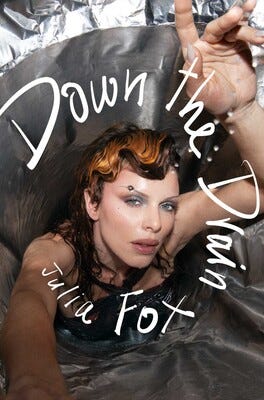
I did not know that you could get a job as a dominatrix by writing an essay until I read Julia Fox’s ‘Down the Drain,’ the most intense and wild memoir ever. And Fox’s stint working in a Manhattan dungeon isn’t even close to the craziest thing that happened in her life. I knew very little about Fox prior to reading this ebook, which is apparently so in demand it took 11 weeks to free up at the library. All I knew was that she had had a tabloid connection to Kanye West, had co-starred in ‘Uncut Gems’ (she’s great in it) and had been ridiculed on TikTok for saying the words ‘uncut gems’ in a weird way. But the book kept popping up in my social media feeds and among my newsletter friends like
, so I figured I should read it because it seemed, as Fox says in this GIF, that:One of the notes I wrote to myself while reading ‘Down the Drain’ is ‘yikes,’ because Fox has lived through a LOT. She survived an abusive and violent family, abusive and violent classmates in Italy (where she’s from) and in New York City, and an array of abusive and violent boyfriends. She was sexually exploited as a teenager. She was declared a missing person by the NYPD. She was a rich man’s kept woman. She’s battled drug addition, a fight that claimed some of her closest friends. And she’s endured a chronic condition that makes her palms sweaty. I was like:
The book is packed with juicy details, and just when you think it can’t get any more crazy, it does. (One example: she’s slapped by a priest in front of Pope John Paul II, who’s lying in state.) But I was struck more by Fox’s bravery and candor in sharing her life with us, warts and all. Far from a silly internet person, she seems to be trying to make sense of herself and the world around her. And now when I see people mock her on the internet, I’m like:
I’m not sure that Fox has fully figured herself out, but I’m interested to see where she goes from here, in acting, in fashion (I chuckled at her kicker about everyone wearing latex because of her), and as a person. She’s a good writer; ‘Down the Drain’ is a brisk and engaging read. But it’s graphic, and not for every reader. But if you’re looking for an unforgettable celebrity memoir, check out this book.
How it begins:
The year is 1996 and I just landed in the grand metropolis of New York City. The moment we step off the plane and my little feet hit the pavement, I drop my suitcase and cross myself. “Grazie a Dio,” I whisper under my breath. On the plane ride, I had asked my dad, “If the plane gets in an accident, will we all die?” To which he casually replied, “Duh.” The remainder of the flight was spent in silent prayer, my gaze affixed to the ominous, boundless ocean beneath us. Despite my basic knowledge of the English language, I feel more comfortable speaking my native tongue. I was born in Italy and have spent the last few years in Saronno, a small town in the province of Varese, where the city eerily feels like the remnants of what was once a charming little town. But I see past the shitty graffiti coating the pastel pink-colored walls. To me, it’s home.
I’m no stranger to this sprawling city. I’ve already been here more times than I can count. I was two months old the first time we made the transatlantic trek to visit my dad’s family. I even lived here for a while, before disaster struck. But today feels like the very first time. It’s like I’m seeing this place through brand-new eyes. And after the mess that went down last time, this is a fresh start, a chance to wipe the slate clean and try again.
My rating:

‘Down the Drain’ by Julia Fox was published by Simon & Schuster in 2023. 336 pages. $26.96 at Bookshop.org
‘A Coin in Nine Hands’ by Marguerite Yourcenar
‘The demolition of Gemara would take place only in her heart, because stones don’t feel the striking of the pick; her father was too old to suffer, and Angiola no longer gave it a thought.’
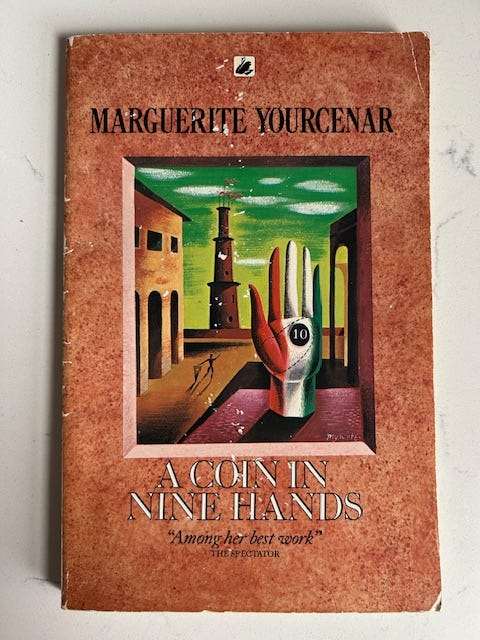
Years ago, before Books on GIF existed, I read ‘Memoirs of Hadrian’ by Marguerite Yourcenar. I don’t remember whether I liked it, but ever since then I had a thought in the back of my brain to return to her work. That thought came to the front of my mind recently after I read
’s year-end fiction roundup where she mentioned a different novel by Yourcenar. Then, while I was browsing a bookstore in Sacramento, I saw this used copy of ‘A Coin in Nine Hands.’ The universe had placed it before me, I was certain, and even though I had never heard of it, I was like:
‘A Coin in Nine Hands’ is set in the 1930s in the 11th year of Italy’s Fascist regime and centers around a woman’s plot to assassinate Mussolini. As the story unfolds, we follow several characters—some are involved in the scheme, others aren’t—who are connected by a 10 lira coin that passes among them through ordinary interactions, providing a glimpse of life under Fascism. Intellectual discourse is stifled, and political dissidents are locked up. Friends and lovers are threatened by spies and may be spies themselves. Angry mobs drive a family from a home that’s been theirs for generations. Aging artists despair. Superstition reigns. The political energy and values of youth wane into tired acceptance. In her afterword, Yourcenar talks about how she originally published a version of the story in 1934, before Italy’s invasion of Ethiopia and its alignment with the Axis, but revised it in 1959 to more sharply illustrate a society unknowingly on the verge of disaster. I was like:

‘A Coin in Nine Hands’ has some of the most beautiful and precise writing that I’d read all year. I couldn’t let my mind wander for a second; every word is vital. I love how it cleverly and powerfully shows how everything and everyone is connected, even though we might not realize it. And I love how it told a political story that’s still relevant today through an exploration of human connection. And, I love that the book is short! If you’re looking for a quick, beautiful and timely read, check out this book.
How it begins:
Paolo Farina was a man from the provinces, still young, rather prosperous, as honest as can be expected of someone on intimate terms with the law, and popular enough in his village in Tuscany not to be scorned because of his misfortune. People felt sorry for him when his wife ran away to Libya to follow a lover she hoped would make her happy. For she had not been happy the six months she kept house for Paolo Farina and had to take the nonstop advice of a shrill mother-in-law. But Paolo, himself blindly happy to possess this young woman and separated from her by his dense satisfaction, had not been aware of her restlessness. When she left, after a scene that humiliated him in front of the two maids, he was surprised that he had been unable to make her love him.
But his neighbors’ judgements reassured him; she must be guilty, he thought, since the little town commiserated with him. Angiola’s flight was blamed on her southern blood; everyone knew the young woman came from Sicily. But people were appalled that she had fallen so low, seeing that she came from a good family and had had the good fortune to have been brought up in Florence at the Convent of Noble-women, and seeing, furthermore, that she had been so well received in Pietrasanta. Everyone agreed that, all in all, Paolo had been a perfect husband. More perfect than the village realized, since Paolo had met, helped, then married Angiola under circumstances in which a prudent man would ordinarily not marry. But he did not use these reminders, as he could have, to blame Angiola for even more ingratitude, because he himself had already forgotten them. He had done his best to erase these details from his memory, mostly as a kindness to his young wife, to make her forget what he called her misadventure, and in part as a kindness to himself, because it is not pleasant to be reminded that the woman one possesses fell in one’s arms more or less on the rebound.
My rating:
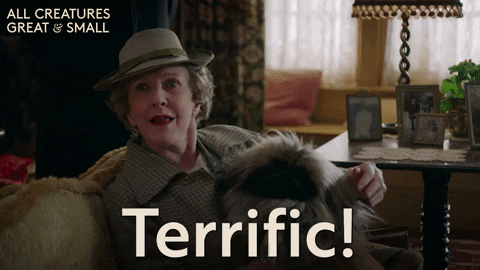
‘A Coin in Nine Hands’ (‘Denier du rêve’) was originally published by Editions Bernard Grasset in 1934. A revised edition was published by Librairie Plon in 1959 and by Editions Gallimard in 1971. Translated from the French by Dori Katz, and published by Aidan Ellis in 1983, by Black Swan in 1984 and by Farrar, Strauss & Giroux in 1986. $15.81 at Bookshop.org.
‘Kappa’ by Ryunosuke Akutagawa
‘Sometime later, when I finally came to, I found myself lying faceup surrounded by a crowd of Kappas.’
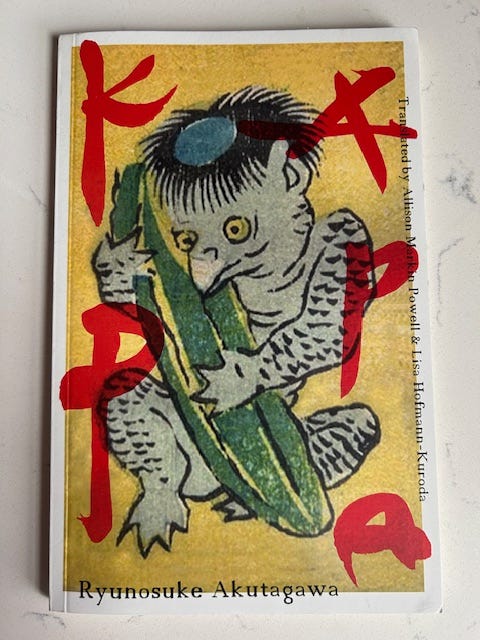
‘Kappa’ is a novella I picked up solely because of the cover design. I mean, look at that weird little guy hugging a pickle! Even though I had not heard of the book or the writer, I figured:
A patient at a mental hospital claims to have lived with creatures from Japanese folklore called kappa. He saw one out in the countryside and tried to capture it before falling into a hole that leads to their strange subterranean world. While among the kappa—who are short in stature, have webbed hands and feet, beaks, and a hard shell-like disk on their heads—he learns their language, and about their bizarre habits and customs. Among them are their notions of abortion rights (unborn kappa are asked in utero whether they want to join the world), capitalism (laid off workers are killed and their bodies recycled) and criminal justice (it would take too long to explain this here). He also attends concerts and hangs out at a bar with philosophers. Eventually, he returns to the human world—a journey that lands him in the hospital, because when people learn about his time among the kappa, they’re like:

I learned from the blurb on the back cover that one of Japan’s most prestigious literary awards is named for Akutagawa. It goes on to add that he killed himself shortly after completing ‘Kappa.’ He was 35. It was a somber and shocking end note for a book I very much enjoyed. I imagine the original intent of ‘Kappa’ was to comment on Japanese society of a century ago, when Akutagawa lived, but that flew over my head. Still, there’s a lot for the modern reader to chew on, particularly the capitalism bits. Even better, ‘Kappa’ is a lightning-fast read—I got through it in less than a day—and the writing is crisp and evocative. If you’re looking for a short story that evokes ‘Alice in Wonderland,’ ‘Gulliver’s Travels’ and ‘The Matrix,’ read this book.
How it begins:
This is a story told by a certain psychiatric patient—Patient No. 23, to be exact. It is a story he tells to anyone who will listen. I presume he’s at least thirty, though at first glance he appears quite the youthful-looking madman. He’s spent half his life—no, never mind, that’s not important. He relayed the following long-winded story to me and the hospital director, Dr. S, while sitting stock still, his knees locked in his arms, and only darting his eyes toward the window now and again (beyond the barred window, a single blue oak tree stretched its bare branches against the wintry sky). However, that’s not to say that he made no gestures at all. Indeed, as he talked on and on, he became somewhat animated. For example, whenever he expressed surprise, he’d suddenly throw his head back …
I’ve made every attempt to copy down his story here just as he told it to me. If, however, the reader is dissatisfied with my notes, I suggest they go and pay a visit to the S. psychiatric ward themselves, which they will find in XX village, just outside of Tokyo. No doubt they will be greeted by the childlike Patient No. 23, who will bow his head politely as he gestures toward a hard, cushionless chair. Then, with a melancholy smile, he will repeat the following story. At the end of which—oh yes, I remember vividly the expression on his face as he finished speaking—he will leap to his feet and immediately begin shaking his fists in the air, yelling at his listener, “Get out!! Get out, you son of a bitch!!! You’re just another stupid, jealous, obscene, shameless, conceited, cruel, selfish animal!! Get out! You son of a bitch!!!”
My rating:

‘Kappa’ by Ryunosuke Akutagawa was published by New Directions Books in 2023. Translated from the Japanese by Allison Markin Powell and Lisa Hofmann-Kuroda. 82 pages. $12.97 at Bookshop.org.
Recent pickups:
‘Foundation’ by Isaac Asimov (Dark Carnival)
‘Toomas Nipernaadi’ by August Gailit (East Bay Booksellers)
Before you get on my case about the Apple TV tie-in cover on the Asimov book, know this: I was not leaving Dark Carnival without buying something, and this book was small enough to fit in my luggage that was already overflowing with books I bought and brought on the trip. And if I didn’t buy it, I never would have gotten this free bookmark from the cashier that she made from an old comic book. Isn’t it awesome?
Books on GIF does not solicit review copies. We feature books we purchase at independent bookstores around New York City and on our travels, or were borrowed electronically from the Brooklyn Public Library.
What’s next:
Before you go:
ICYMI: Review #222
See this: Donna and I visited Sacramento’s wonderful Crocker Art Museum and checked out an exhibit about AI. One of the pieces was an interactive artwork by artist Alexander Reben that allowed visitors to speak a prompt into a microphone, and then an AI program churned out a blurb and a visual. For ‘Books on GIF,’ the machine wrote: ‘This painting depicts a vibrant and eclectic library, filled with shelves of books of all different sizes and colors. The books appear to be floating in the air, creating a mesmerizing GIF-like effect. It’s a colorful and whimsical scene, evoking a sense of wonder and exploration.’ And here’s the image:
While I’m wary of AI and its implications for jobs and artists’ works, I thought the machine did a pretty good job. You can read more about the exhibit in The New York Times.
If you enjoyed this review:
Thanks for reading, and thanks especially to Donna for editing this newsletter!
Until next time,

MPV


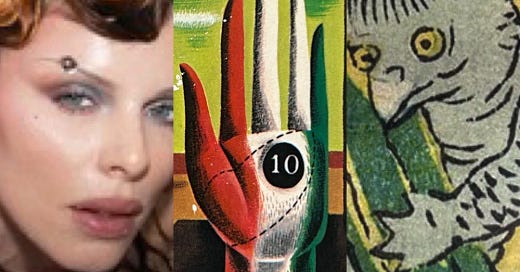





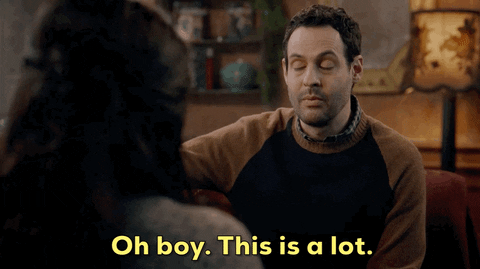


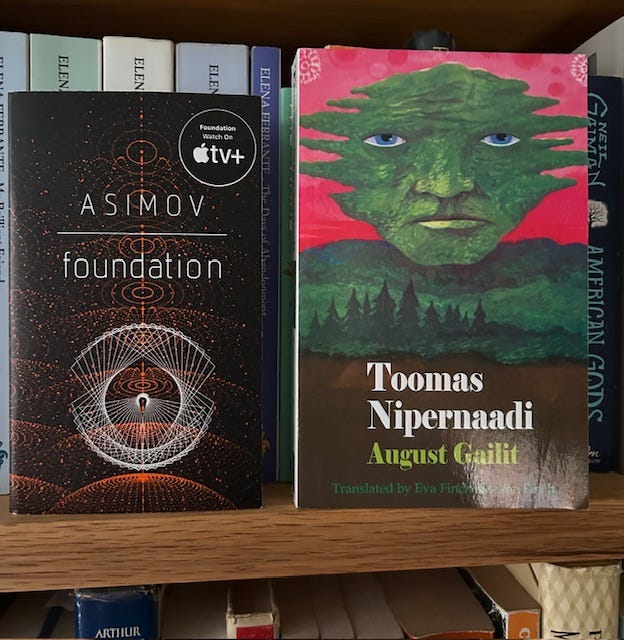
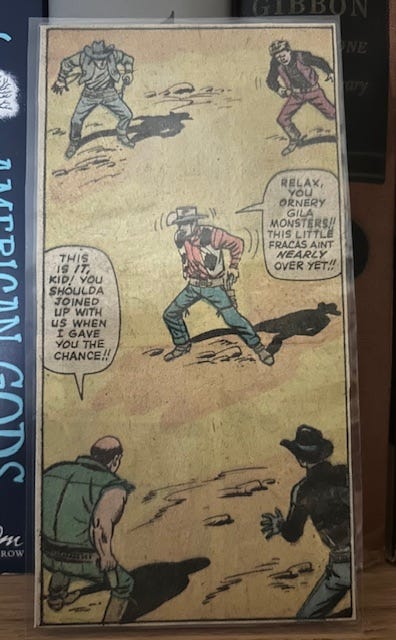
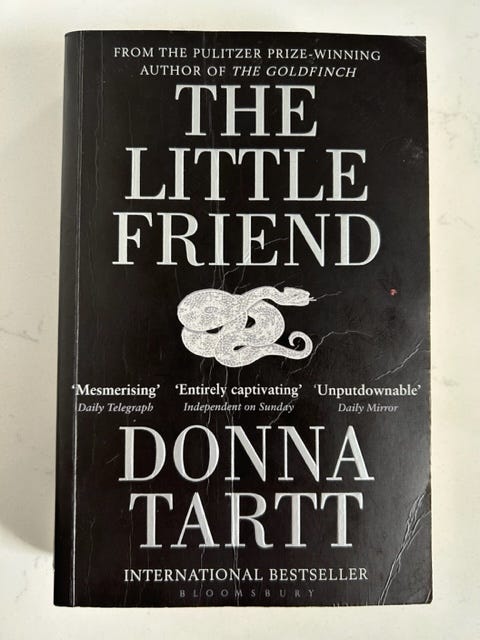
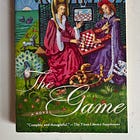


Glad you had such good reading on your break and a great trip. I have been having a hard time reading; I pick up a book and my mind starts to wander. I have had a better time this week reading A Town Like Alice by Nevil Shute. Not a happy story at all, but it is engaging. I finished Mother Daughter Murder Night by Nina Simon which was good, although I figured out the killer. Also finished the 4th in The Thursday Murder Club, The Last Devil to Die by Richard Osman. They are on the light side, but there are bodies and real life issues tackled in each one. Happy New Year to you and Donna!
Three wonderful reviews - Happy New Year Mike! The picture of Lake Tahoe is beautiful.